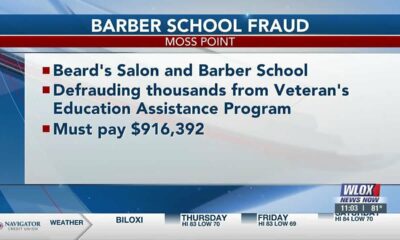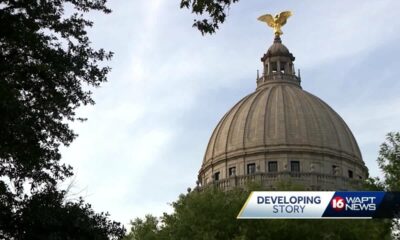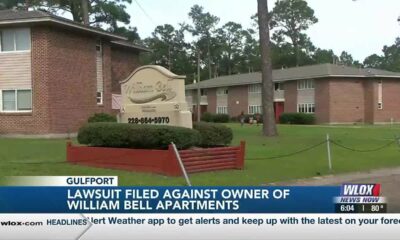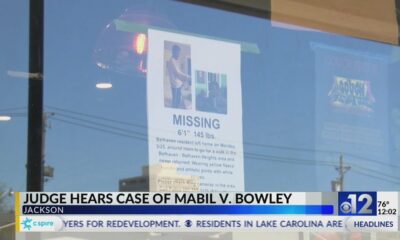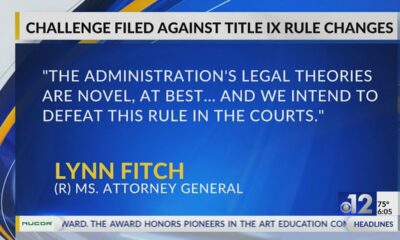Mississippi News
Settlement to desegregate higher education explained
The settlement that aimed to desegregate higher education in Mississippi, explained
The settlement that capped off a landmark case in the fight to desegregate higher education in Mississippi is about to run out.
Come July, the Legislature will have fulfilled its obligations in the $503 million payout that effectively ended the class-action lawsuit known as Ayers v. Fordice. And advocates for the historically Black public universities in Mississippi will start to look at whether it made up for more than a century of segregation.
How did we get here?
In 1975, Jake Ayers, a civil rights activist from Glen Allan, sued the state of Mississippi on behalf of his son, a student at Jackson State University. Ayers alleged that lawmakers, the IHL board, and the predominantly white universities used nearly a dozen policies and practices to prop up a dual system of higher education: One for Black students and one for white students.
After years of negotiations, the suit went to trial in 1982. A federal district judge in Oxford ruled that Mississippi universities had done enough to desegregate simply by adopting some “race-neutral policies.”
Undeterred, the plaintiffs fought the case all the way to the U.S. Supreme Court and, in 1992, the justices ruled in their favor. Mississippi had to eliminate any policy or practice that was a vestige of segregation — and contributed to the “racial identifiability” of each school. That meant the predominantly white universities had to edit their admissions policies so that Black students could gain entry. But the HBCUs also had to do more to attract white students.
It would take 10 more years for the state of Mississippi and the plaintiffs to agree on how to address the issues the Supreme Court raised. Over the objections of the Ayers family, the case was finally settled in 2002. The agreement focused on four areas where funding could help root out “remnants of a dual, segregated system of higher education” in Mississippi: Academic programs, capital improvements, university endowments, and financial grants to students.
Together, these four areas totalled approximately $417 million in promised funds over 17 years. Another $2.5 million in attorneys fees and $83 million that the Legislature had already appropriated brought the total payout to $503 million.
By the time the settlement is said and done next year, the HBCUs will actually have received about $530 million. In fact, $503 million is just the floor — if it wanted, the Legislature could allocate more money to the HBCUs under the auspices of the Ayers agreement.
“The settlement agreement represents the minimum requirements,” Caron Blanton, the IHL spokesperson, told Mississippi Today. “The Legislature has the authority to exceed those amounts at its discretion.”
Funding pre-college summer programs to help more Black students go to white colleges
The Supreme Court ordered Mississippi to find more pathways for Black students to gain access to the predominantly white institutions, or PWIs. One way the state accomplished that was by directing all eight public universities to start using the same admissions standards.
Another was through the creation of “summer development programs.” These were nine-week remedial courses for students who did not meet the new admission criteria but still wanted to go to college. The settlement set aside $6.25 million in financial aid for any student, regardless of race, who qualified. The Legislature ultimately appropriated $6.5 million. These grants ended in 2015 but the summer programs continue.
These programs were subject to some criticism. Some say it's problematic that students who received the money set aside for these programs went to students, not directly to the HBCUs. Others have questioned whether these programs were effective. In a 2016 dissertation for University of Southern Mississippi, Amanda Susanne King found that the summer programs were “not increasing educational opportunities for Blacks at four-year public institutions in Mississippi.”
Bigger and better — and more — academic programs
As part of the settlement agreement, Mississippi's three HBCUs proposed establishing new academic and professional programs. This was thought to be another way the HBCUs could meet the court's order to diversify and attract more non-Black students.
The three HBCUs (Jackson State, Alcorn State University, and Mississippi Valley State University) were to split $245.8 million over 17 years for 31 new academic programs and 11 enhanced academic programs. As of this year, the Legislature has allocated $249.1 million.
Valley State and Alcorn State both received $53.7 million. Valley State used the funds to strengthen its education programs by establishing a graduate program in special education, as well as several programs in biology, chemistry, history and math. Alcorn State focused on building up its nursing and business programs by enhancing library and academic technology, and creating a masters of biotechnology.
Jackson State used its $141.8 million to open an engineering school, a public health school, a college of public service, and to establish the “Provost's Library and Scholarship Pool.”
A full list of programs established by the universities can be found here.
New buildings but little money for deferred maintenance
The settlement set aside $75 million for capital improvements on HBCUs' campuses. As of this fiscal year, all $75 million has been obtained by the universities.
Some of the completed projects were undertaken to support the new and expanded academic programs at the schools. At Alcorn State, five projects were proposed in the settlement agreement. These included new equipment for the MBA program at its Natchez campus and repairs and renovations of Dumas Hall on the Lorman campus — both part of the effort to get an accredited business program — a biotechnology building, a new fine arts center in Natchez and property to “improve security and access” to the Lorman campus.
According to the IHL's annual update in the case, Alcorn spent $12.4 million to construct the biotechnology building, $4.7 million on renovations at Dumas Hall, and about $243,000 to obtain furniture for the MBA program (the third phase of that project was not completed). Alcorn did not build a fine arts center in Natchez but spent $7.7 million on a fine arts facility in Lorman.
Alcorn did not request or spend any bond funds to purchase property to “improve security and access” on the Lorman campus, according to IHL. This is an issue many students still have with Alcorn's campus.
Jackson State proposed two projects in the original settlement agreement. Those were purchasing the former AllState Building at 1230 Raymond Road for $3 million and constructing an engineering building on campus for $20 million. Jackson State ultimately spent $3.3 million on the AllState Building, now called the Mississippi e-Center, and $19.9 million on the engineering building.
Mississippi Valley State proposed four projects: $5 million worth of library enhancements, a science and technology building, $3 million for landscaping and drainage, and $1.9 million for repairs and renovations. Valley State obtained and expended funds in every category except repairs and renovations, for which the university did not request any funds.
Despite this money, the HBCUs still contend with issues related to poor facilities and deferred maintenance. Where the PWIs can lean on their large endowments to pay for maintenance, Mississippi's HBCUs are more reliant on state funding. The Legislature has cut the budget for higher education in recent years, making it harder for the HBCUs to pay for regular upkeep.
Larger and better funded endowments
When it came to endowments — a sign of a university's wealth — the gap between the HBCUs and the PWIs was particularly stark. By the mid-1990s, the endowments of Mississippi's PWIs were worth a combined $115 million. The three HBCUs had just $5 million in endowments.
The settlement sought to remedy this gap by paying out $105 million to create public and private endowments. But there was a catch: In order to access the funds, the HBCUs were required to have graduating classes 10% of which were “other-race” (read: white) students. At that point, the universities could use the endowments for other goals like raising faculty salaries. Until then, any interest generated was to be used to attract non-Black students.
The public endowment, which totalled $70 million, was fully funded by legislative appropriations in fiscal year 2019.
The private endowment is a different story. The IHL board was supposed to raise $35 million in donations. While the settlement agreement specified the board was to use “its best efforts” to raise the money, it also specified that “the inability to do so shall not be cause for setting aside this agreement.” Today, the IHL board has raised just $1,036,600.
The under-funded private endowment is one reason why some argue the Ayers settlement is not, and was never, enough to truly desegregate higher education in Mississippi. Many also point to the Legislature, which has slashed the budget for higher education in Mississippi. HBCUs have turned to the Ayers money to make up for the gap – not to catch up to the PWIs as intended.
This article first appeared on Mississippi Today and is republished here under a Creative Commons license.
Mississippi News
1 dead, 2 injured in Jackson crash involving stolen SUV
SUMMARY: A juvenile has died and two others were injured in Jackson after a crash involving a stolen vehicle. Officers responded to a call about a stolen brown Kia SUV and found three male juveniles near the crashed vehicle. The juveniles were taken to the hospital, where one passed away from his injuries. The investigation into the incident is ongoing. Additionally, multiple homes in Vicksburg were damaged by gunfire, adding to the violence in the area. Police are continuing to investigate both incidents to determine the circumstances surrounding the crash and the shooting.
The post 1 dead, 2 injured in Jackson crash involving stolen SUV appeared first on www.wjtv.com
Mississippi News
Calm for tonight with thunderstorms by Sunday afternoon – Home – WCBI TV
SUMMARY: A few spotty showers are possible this evening, with thunderstorms expected tomorrow afternoon and into the overnight hours. Temperatures will reach the lower 90s by the middle of next week. Tonight, expect a few spotty showers with overnight lows in the mid 60s. Tomorrow will start off mild with partly cloudy skies and temperatures in the middle 80s. Rainy conditions will continue into next week with temperatures climbing into the upper 80s and lower 90s. Heavier rain is expected by Thursday as a cold front pushes through.
The post Calm for tonight with thunderstorms by Sunday afternoon – Home – WCBI TV appeared first on www.wcbi.com
Mississippi News
2nd Jackson man sentenced for bank fraud scheme
SUMMARY: Ronald Gardner, a Jackson man, was sentenced to 61 months in federal prison for conspiracy to commit bank fraud and aggravated identity theft. He and his co-conspirator, Anthony Craig Myrick, opened an account at a Jackson bank in someone else's name, deposited counterfeit U.S. Treasury checks, withdrew the cash, and used false identification cards. Gardner admitted to manufacturing the counterfeit checks and using another person's identity. The scheme affected at least 10 victims. Both Gardner and Myrick were indicted and pled guilty, with Myrick receiving a 26-month sentence. They were also ordered to pay restitution to the bank.
The post 2nd Jackson man sentenced for bank fraud scheme appeared first on www.wjtv.com
-
Mississippi Today7 days ago
On this day in 1951
-
SuperTalk FM2 days ago
Driver’s education set to become mandatory in Mississippi as bill passes
-
SuperTalk FM5 days ago
Festival merger in Leland sets up one major event for Mississippi Delta
-
Mississippi Business4 days ago
Geartek expanding operations in Alcorn County
-
SuperTalk FM1 day ago
State approves $160M to expand Highway 7 to four lanes in Lafayette County
-
SuperTalk FM6 days ago
PERS bill set to phase in employer rate increase heads to governor’s desk
-
Mississippi News5 days ago
Two women accused of shoplifting across southeast captured in Mississippi
-
Mississippi News3 days ago
Altercation at Mississippi police department leads to officer-involved shooting






